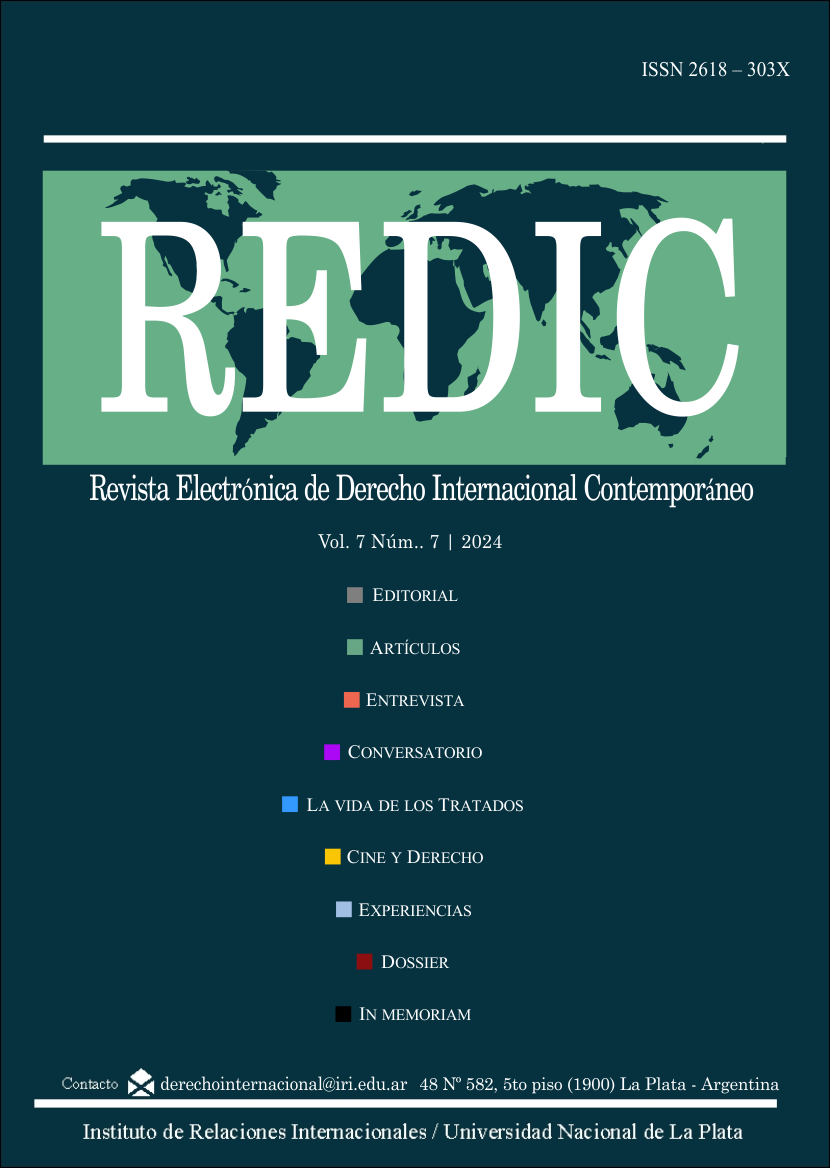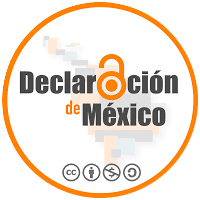Las generaciones futuras en el Derecho Internacional y el ius standi de los pueblos indígenas
DOI:
https://doi.org/10.24215/2618303Xe070Palabras clave:
justicia climática, equidad intergeneracional, derechos indígenasResumen
Este artículo examina el acceso a la justicia de las generaciones futuras indígenas en el contexto de la justicia climática ante el Comité de Derechos Humanos de las Naciones Unidas (CDH). Se centra en el caso Daniel Billy et al. vs. Australia (2022), donde se argumentó que el cambio climático, derivado de la inacción estatal, vulnera los derechos humanos de las comunidades indígenas australianas de las Islas Torres, afectando sus modos de vida y su supervivencia cultural. El análisis destaca las barreras procesales que enfrentan las generaciones futuras para ser reconocidas como sujetos de derechos, especialmente la falta de legitimidad procesal (ius standi). A través de este caso, el artículo subraya la importancia de integrar principios de equidad intergeneracional y justicia climática en el derecho internacional para proteger los derechos de las futuras generaciones. Concluye que el derecho a la vida, según el Pacto Internacional de Derechos Civiles y Políticos (PIDCP), debería interpretarse para incluir la protección de la vida futura, especialmente ante amenazas climáticas.
Referencias
Agius, E. (1990). From Individual to Collective Rights, to the Rights of Mandkind: The historical evolution of the subject of Human Rights. En S. Busuttil, E. Agius, P. Serracino Inglott y T. Macelli (Eds.) (1990), Our responsibilities towards future generations (pp. 26-48). Gutenburg Press.
Almeida, P. W. (2022). O legado de Antônio Augusto Cançado Trindade: as múltiplas facetas de um percurso voltado para a construção de um novo jus gentium. CEBRI-Revista, 1(2), 186-200.
Auz Vaca, J. (2024). Litigio Climático y Derechos Humanos en el Sur Global. Apuntes para el debate. EUNOMÍA. Revista En Cultura De La Legalidad, (26), 416-433. https://doi.org/10.20318/eunomia.2024.8519
Bossuyt, M. J. (1987). The Optional Protocol to the International Covenant on Civil and Political Rights. In Guide to the “Travaux Préparatoires” of the International Covenant on Civil and Political Rights (pp. 791–818). Brill | Nijhoff. https://doi.org/10.1163/9789004638150_006
Brown Weiss, E. (1988). In fairness to future generations: international law, common patrimony, and intergenerational equity. The United Nations University.
Brown Weiss, E. (1990). Our Rights and Obligations to Future Generations for the Environment. Georgetown Law Faculty Publications And Other Works, 84, 198-207.
Brown Weiss, E. (2021). Intergenerational Equity. Max Planck Encyclopedias of International Law [MPIL], Oxford Public International Law.
Carrillo-Santarelli, N. y Seatzu, F. (2024). The protection of future generations as a key to transform international law and prevent environmental catastrophes. Jura Gentium, 21(1), 117-154.
Chimni, B.S. (2024) The Status of the Individual in International Law: A TWAIL Perspective. En A. Peters y T. Sparks (Eds.), The Individual in International Law, The History and Theory of International Law (pp. 231-249). Oxford Academic.
Eisenstadt, T. A. y West, K. J. (2017). Indigenous belief systems, science, and resource extraction: climate change attitudes in Ecuador. Global Environmental Politics, 17(1), 40-58. https://doi.org/10.1162/GLEP_a_00389
Fernández-Sánchez, P. A. (2023) ¿De verdad Francisco de Vitoria fue el padre del Derecho Internacional? Revista De La Facultad De Derecho, 13(2), 39-74. https://doi.org/10.31054/2314.3061.v13.n2.43092
Francioni, F. (2007). The Rights of Access to Justice under Customary International Law. En F. Francioni (Ed.), Access to Justice as a Human Right (pp. 1-55). Oxford Collected Courses of the Academy of European Law.
Giménez, I. A. y Petit de Gabriel, E. (24 de octubre de 2022). Cambio climático y derechos humanos: el caso de los Isleños del Estrecho de Torres. Aquiescencia. Blog de Derecho Internacional. https://aquiescencia.net/2022/10/24/cambio-climatico-y-derechos-humanos-el-caso-de-los-islenos-del-estrecho-de-torres/
Hague Institute for Innovation of Law. (2012). Towards Basic Justice Care for Everyone. Challenges and Promising Approaches. Trend Report | Part 1.
Hernández, G. (2024). Legal Positivism and the Individual in International Law. En A. Peters y T. Sparks (Eds.), The individual in International Law, the history and theory of International Law (pp. 167-188). Oxford.
Houghton, R. (2024). The Individual in Feminist Approaches to International Law. En A. Peters y T. Sparks (Eds.), The individual in International Law, the history and theory of International Law (pp. 251-272). Oxford Academic.
Jelić, I. y Mührel, L. (2022). The Human Rights Committee-Challenges and Prospects for Enhanced Effectiveness and Integration. Journal Of Human Rights Practice, 14(1), 17-43. https://doi.org/10.1093/jhuman/huac026
Jiménez Sánchez, C. (2023). El derecho humano de acceso a la justicia en tribunales internacionales: pasado y futuro del derecho internacional. En C. Jiménez Sánchez y C. M. Zamora-Gómez (Coords.), El derecho humano de acceso a la justicia en tribunales internacionales (pp. 1-15). Comares.
Kammerhofer, J. (2016). International Legal Positivism. En A. Orford y F. Hoffmann (Eds.), The Oxford Handbook of the Theory of International Law (pp. 407-426). Oxford Handbooks.
Kashwan, P. (2021). Climate justice in the Global North: An introduction. Case Studies In The Environment, 5(1), 1-13. https://doi.org/10.1525/cse.2021.1125003
Korber Gonçalves, V., Machado Lemos Ribeiro, T. M., Aoki Inoue, C. Y. y Lins, J. (2024). Indigenous climate finance and the worlding of International Relations: climate justice in motion. International Relations, 38(3), 388-406. https://doi.org/10.1177/00471178241269764
Malhotra, A. (1998). A commentary on the status of future generation as a subject of international law. En E. Agius y S. Busuttil (Coords.), Future generations and international law (pp. 39-50). Londres.
McGregor, L. (2012). The role of supranational human rights litigation in strengthening remedies for torture nationally. The International Journal Of Human Rights, 16(5), 737-754. https://doi.org/10.1080/13642987.2012.685320
Minnerop, P. (2023). Intergenerational Preparedness: Climate Change, Community Interest Obligations and the Environmental Rule of Law. Global Policy, 15(5), 20-41. https://doi.org/10.1111/1758-5899.13219
Mosler, H. (1980). Chapter III The Position of the Individual in the System of International Law. En H. Mosler, The International Society as a Legal Community (pp. 54–65) Brill | Nijhoff. https://doi.org/10.1163/9789004640498_007
Palombino, G. (2020). La construcción del principio de equidad generacional: ¿Hacia una democracia sostenible? Revista De Derecho Constitucional Europeo, 33.
Paust, J. J. (2010). Non-State Actor Participation in International Law and the Pretense of Exclusion. Virginia International Journal Of Law, 51(4), 977-1004. http://dx.doi.org/10.2139/ssrn.1701992
Peters, A. (2024). Before Human Rights: The Formation of the International Legal Status of the Individual, 1914-45. En A. Peters y T. Sparks (Eds.), The Individual in International Law, The History and Theory of International Law (pp. 119–164). Oxford Academic.
Peters, A. y Sparks, T. (2024). Conclusions: Reconsidering the Individual in International Law. En A. Peters y T. Sparks (Eds.), The individual in International Law, the history and theory of International Law (pp. 387-418). Oxford Academic.
Petit de Gabriel, E. W. y Giménez, I. A. (2023). Solicitud de Opinión Consultiva a la Corte Interamericana de Derechos Humanos presentada por la República de Chile y la República de Colombia sobre Emergencia Climática. Amicus Curiae. https://www.corteidh.or.cr/observaciones_oc_new.cfm?nId_oc=2634
Petit de Gabriel, E. W. y Giménez, I. A. (2024). El derecho de los menores al acceso a la justicia y a recursos efectivos y la regla de agotamiento de recursos internos en los procedimientos jurisdiccionales y cuasi jurisdiccionales de protección internacional de los derechos humanos: una contribución a partir de casos de la litigación climática. Convocatoria de propuestas sobre el proyecto de Observación general nº 27 sobre el derecho del niño al acceso a la justicia y a recursos efectivos. https://www.ohchr.org/en/calls-for-input/2024/call-submissions-draft-general-comment-no-27-childrens-rights-access-justice
Pureza, J. M. (2007). Usos contrahegemónicos y de oposición del derecho internacional: de la Corte Penal Internacional a la herencia común de la humanidad. En S. Boaventura de Sousa Santos y C. A. Rodríguez Garavito (Eds.), El derecho y la globalización desde abajo: hacia una legalidad cosmopolita (pp. 240-250). Anthropos.
Raz, J. (2010). Human Rights in the Emerging World Order. Transnational Legal Theory Columbia Public Law Research Paper No. 09-219, Oxford Legal Studies Research Paper No. 47/2009, 31-47. http://dx.doi.org/10.2139/ssrn.1497055
Ribot, J. (2010). Vulnerability does not fall from the sky: toward multiscale, pro-poor climate policy. En R. Mearns y A. Norton (Eds.), Social Dimensions of Climate Change: Equity and Vulnerability in a Warming World (pp. 47-74). The World Bank.
Roucounas, E. (2019). A Landscape of Contemporary Theories of International Law. Brill | Nijhoff. https://doi.org/10.1163/9789004385368
Shany, Y. (2013). The Effectiveness of the Human Rights Committee and the Treaty Body Reform. Hebrew University Of Jerusalem Research Paper, (2-13), 1-23.
Shelton, D. (15 de noviembre de 2023). Request for an Advisory Opinion on the Climate Emergency and Human Rights before Inter-American Court of Human Rights. https://www.corteidh.or.cr/observaciones_oc_new.cfm?nId_oc=2634
Shikhelman, V. (2018). Access to Justice in the United Nations Human Rights Committee, Michigan Journal Of International Law, 39(3), 453-531. https://repository.law.umich.edu/mjil/vol39/iss3/5
Slobodian, L. (2020). Defending the Future: Intergenerational Equity in Climate Litigation. Georgetown Environmental Law Review, 32, 569-589.
Steiner, H. J. (2000). Individual claims in a world of massive violations: What role for the Human Rights Committee? En P. Alston y J. Crawford (Eds.), The Future of UN Human Rights Treaty Monitoring (pp. 15-54). Cambridge University Press.
Sulyok, K. (2023). A rule of law revolution in future generations’ litigation – intergenerational equity and the rule of law in the Anthropocene. Re:constitution Working Paper, Forum Transregionale Studien, 14, 1-28. https://doi.org/10.25360/01-2023-00005
Surasky, J. L. (2022). In memoriam: Antônio Augusto Cançado Trindade. Revista Electrónica De Derecho Internacional Contemporáneo, 5(5).
Tams, C. J. (2018). International Community as a Legal Notion. Global Cooperation Research Papers, 21, 1-25. https://doi.org/10.14282/2198-0411-GCRP-21
Villegas Delgado, C. y Alcaide-Fernández, J. (2023). In Memoriam Antônio Augusto Cançado Trindade (1947-2022), humanista y (re)humanizador del Derecho Internacional. Peace & Security-Paix et Sécurité Internationales (EuroMediterranean Journal Of International Law And International Relations), (11). https://doi.org/10.25267/Paix_secur_int.2023.i11.0901
Watene, K. (2024). Indigenous Philosophy and Intergenerational Justice. En H. Abe, M. Fritsch y M. Wenning (Eds.), Intercultural Philosophy and Environmental Justice between Generations: Indigenous, African, Asian, and Western Perspectives (pp. 17-32). Cambridge University Press.
WYCJ, PISFCC, Sobenes, E., Alarcon, M. J. y Rose, J. (2024). The Youth Climate Justice Handbook. Legal Memorandum. https://www.wy4cj.org/handbook
Archivos adicionales
Publicado
Número
Sección
Licencia
Derechos de autor 2024 María Cristina Zamora-Gómez

Esta obra está bajo una licencia internacional Creative Commons Atribución-NoComercial-CompartirIgual 4.0.
Aquellos autores/as que tengan publicaciones con esta revista, aceptan los términos siguientes:
- Los autores/as conservarán sus derechos de autor y garantizarán a la revista el derecho de primera publicación de su obra, el cuál estará simultáneamente sujeto a la Licencia de reconocimiento de Creative Commons (BY-NC-SA) 4.0 que permite a terceros compartir la obra siempre que se indique su autor y su primera publicación esta revista, no se haga uso comercial, y si se remezcla, se transforma o se crea a partir del material, se debe distribuir bajo la misma licencia del original.
- Los autores/as podrán adoptar otros acuerdos de licencia no exclusiva de distribución de la versión de la obra publicada (p. ej.: depositarla en un archivo telemático institucional o publicarla en un volumen monográfico) siempre que se indique la publicación inicial en esta revista.
- Se permite y recomienda a los autores/as difundir su obra a través de Internet (p. ej.: en archivos telemáticos institucionales o en su página web) antes y durante el proceso de envío, lo cual puede producir intercambios interesantes y aumentar las citas de la obra publicada. (Véase El efecto del acceso abierto).































